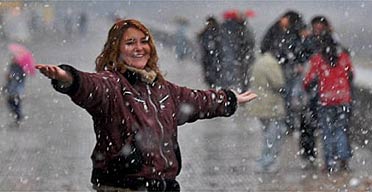The Casa Rosada, the Argentinian president's "Pink House", verged on turning white overnight after Buenos Aires was blanketed in snow for the first time in nearly 90 years.
Children threw snowballs while photographers tried to capture the falling flakes as a party atmosphere descended on the city. Crowds gathered at the Obelisk monument in central Buenos Aires, the traditional focal point for Argentinian celebrations and protests.
"Despite all my years, this is the first time I've ever seen in snow in Buenos Aires," said Juana Benitez, an 82-year-old who joined children celebrating in the streets.
The national weather service said it was the first major snow in Buenos Aires since June 22, 1918, though sleet or freezing rain have been periodically reported in decades since.
One man stripped to his shorts to welcome the snow. Motorists honked horns, some with small snowmen on their car bonnets.
The conditions led to the deaths of three people and the coastal city's domestic airport, Aeroparque, was closed while there were delays to flights at the international airport, Ezeiza.
A government minister, Alberto Fernández, called on people to conserve energy and said gas exports to Chile would be reduced while the cold weather continued, La Nación newspaper reported.
The storm struck on Argentina's independence day holiday, adding to a festive air and prompting radio stations to play an old tango song inspired by the 1918 snowfall, "What a night!"
"This is the kind of weather phenomenon that comes along every 100 years," forecaster Hector Ciappesoni told La Nación newspaper. "It is very difficult to predict."
The extreme weather was triggered by a front of Antarctic air that has pushed north and caused temperatures to plummet in many regions. The Patagonian ski resort town of Bariloche recorded its lowest temperatures in 44 years and left many homes without water.
Lakes froze over in Río Negro province as temperatures reached minus 32C, Clarín newspaper reported, and 500 travellers were forced to take refuge in Río Cuarto after roads were closed.
The snow followed a bitter cold snap in late May that saw subfreezing temperatures, the coldest in 40 years in Buenos Aires. That cold wave contributed to an energy crisis and 23 deaths from exposure.
